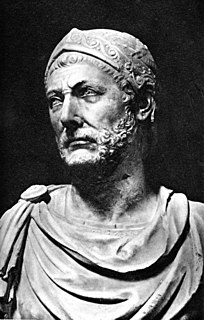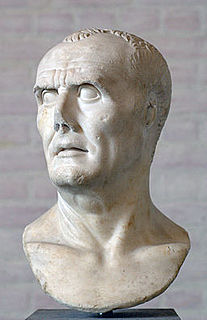Related Research Articles

Hannibal was a Carthaginian general and statesman who commanded the forces of Carthage in their battle against the Roman Republic during the Second Punic War. He is widely regarded as one of the greatest military commanders in history.

The 3rd century BC started the first day of 300 BC and ended the last day of 201 BC. It is considered part of the Classical era, epoch, or historical period.
Year 202 BC was a year of the pre-Julian Roman calendar. At the time it was known as the Year of the Consulship of Geminus and Nero. The denomination 202 BC for this year has been used since the early medieval period, when the Anno Domini calendar era became the prevalent method in Europe for naming years.

This article concerns the 200 BC decade, that lasted from 209 BC to 200 BC.
This article concerns the period 149 BC – 140 BC.
This article concerns the period 159 BC – 150 BC.
This article concerns the period 219 BC – 210 BC.
This article concerns the period 189 BC – 180 BC.
This article concerns the period 199 BC – 190 BC.
Year 203 BC was a year of the pre-Julian Roman calendar. At the time it was known as the Year of the Consulship of Caepio and Geminus. The denomination 203 BC for this year has been used since the early medieval period, when the Anno Domini calendar era became the prevalent method in Europe for naming years.
Year 205 BC was a year of the pre-Julian Roman calendar. At the time it was known as the Year of the Consulship of Scipio and Dives. The denomination 205 BC for this year has been used since the early medieval period, when the Anno Domini calendar era became the prevalent method in Europe for naming years.
Year 209 BC was a year of the pre-Julian Roman calendar. At the time it was known as the Year of the Consulship of Verrucosus and Flaccus. The denomination 209 BC for this year has been used since the early medieval period, when the Anno Domini calendar era became the prevalent method in Europe for naming years.
Year 188 BC was a year of the pre-Julian Roman calendar. At the time it was known as the Year of the Consulship of Messalla and Salinator. The denomination 188 BC for this year has been used since the early medieval period, when the Anno Domini calendar era became the prevalent method in Europe for naming years.
Year 211 BC was a year of the pre-Julian Roman calendar. At the time it was known as the Year of the Consulship of Maximus and Maximus. The denomination 211 BC for this year has been used since the early medieval period, when the Anno Domini calendar era became the prevalent method in Europe for naming years.

Publius Cornelius Scipio was a general and statesman of the Roman Republic and the father of Scipio Africanus.
Gnaeus Cornelius Scipio Calvus was a Roman general and statesman during the third century BC. He played a major part in the Second Punic War establishing Roman Rule in the east of the Iberian Peninsula and tying up several Carthaginian armies keeping them from reinforcing Hannibal.

Lucius Cornelius Scipio Asiaticus was a general and statesman of the Roman Republic. He was the son of Publius Cornelius Scipio and the younger brother of Scipio Africanus. He was elected consul in 190 BC, and later that year led the Roman forces to victory at the Battle of Magnesia.
Mago Barca was a Barcid Carthaginian who played an important role in the Second Punic War, leading forces of Carthage against the Roman Republic in Iberia and northern and central Italy. Mago was the third son of Hamilcar Barca, was the brother of Hannibal and Hasdrubal, and was the brother-in-law of Hasdrubal the Fair.

Publius Cornelius Scipio Africanus was a Roman general and statesman, most notable as one of the main architects of Rome's victory against Carthage in the Second Punic War. Often regarded as one of the best military commanders and strategists of all time, his greatest military achievement was the defeat of Hannibal at the Battle of Zama in 202 BC. This victory in Africa earned him the epithet Africanus.